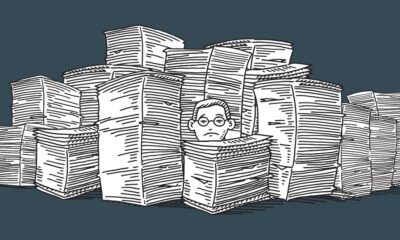Diaspora
Stories from diaspora// Natalia Ciobanu – the traveller who left everything behind for a journey around the globe
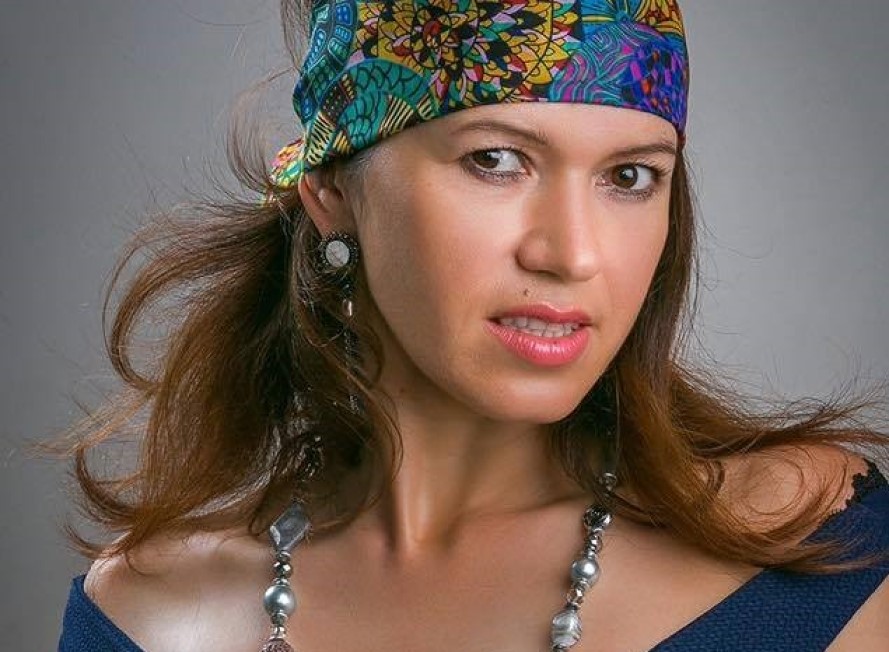
It started from a childhood dream and a personal challenge. Natalia Ciobanu had been practicing as a speech therapist in Paris when she decided to sell a part of her personal belongings, save some money and go on a trip around the world. Some of us only dream about the Monument Valley from the USA, Salar de Uyuni from Bolivia, Machu Picchu from Peru, The Great Wall of China, Mardi Himal Mountain from Nepal or Taj Mahal from India. Natalia already saw all of them and has got amazing plans for her future trips. Today’s story is about her.
About her own concept of travelling
Natalia wanted to get out of the comfort zone and find her limits. “I chose to say ‘goodbye’ to materialism and to experience a minimalist lifestyle, having only a backpack with me. At the same time, I also wanted to explore the world, to admire the beauties of nature, to try out different cuisines and to see what happiness means for other people,” Natalia says.

Even though she had this idea for a long period of time, the real impulse was given to her by her patients.
“The cases of young patients who stayed in the hospital I was working at, being disabled for their lifetime, have accelerated my decision. Life can be short, and we should cherish every moment.”
Hence, it wasn’t just a usual trip for Natalia. Prior to the journey around the globe, Natalia already was an experienced traveller: Martinique, Dominican Republic, Seychelles, Mauritius, Jamaica, Cuba, Morocco, Italy, Spain, Portugal, Israel, England, Vietnam, Laos, Cambodia, Thailand, USA. “But these trips were made in more luxurious conditions. I was a tourist, not a traveller. This is why I needed a change and a new way of exploring things.”
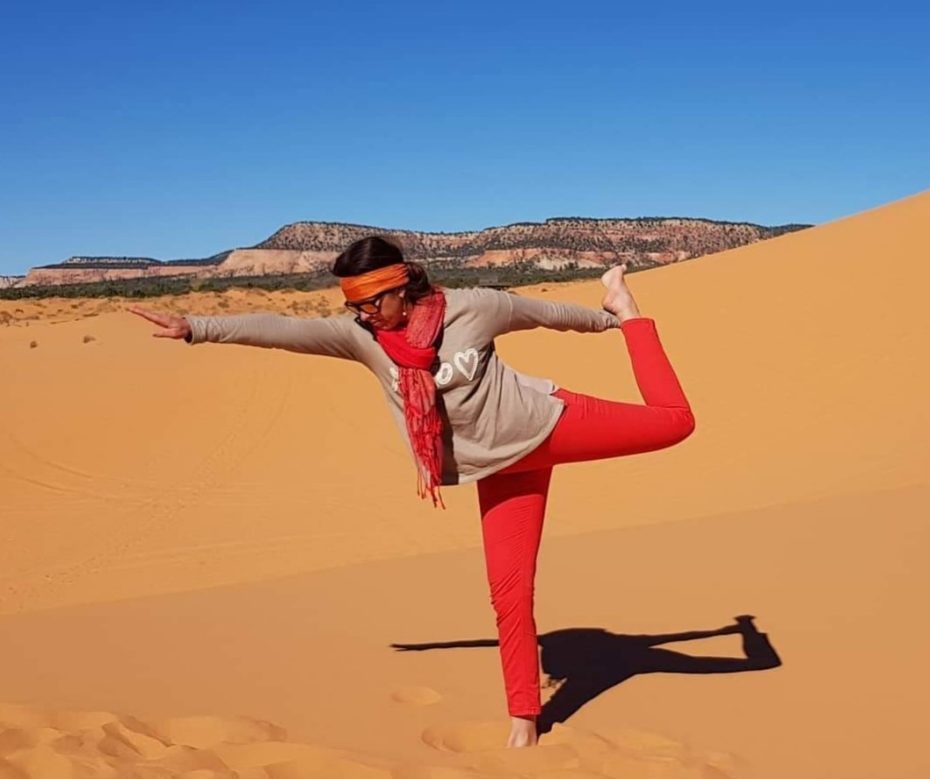
So, she tailored her own way of travelling: alone but open to making new acquaintances, challenging but so exciting, combined with practicing sports and trying out local food, clothes and customs, comfortable rather for the soul than for the body.
About the arrangements before the journey
The preparations were organised really fast: “It was spontaneous, and it was done faster than I expected. My decision was made in August last year. The request for the sabbatical leave was made in September. I received a positive answer in November and on January 6th I was already on the plane. It all happened so fast, I did not even have enough time to solve all my administrative issues,” recalls Natalia. She didn’t even manage to do all the necessary vaccinations.
“I know, for example, a person who planned for one year to go around the world and at the last moment cancelled everything.” Surely, she didn’t want the same.
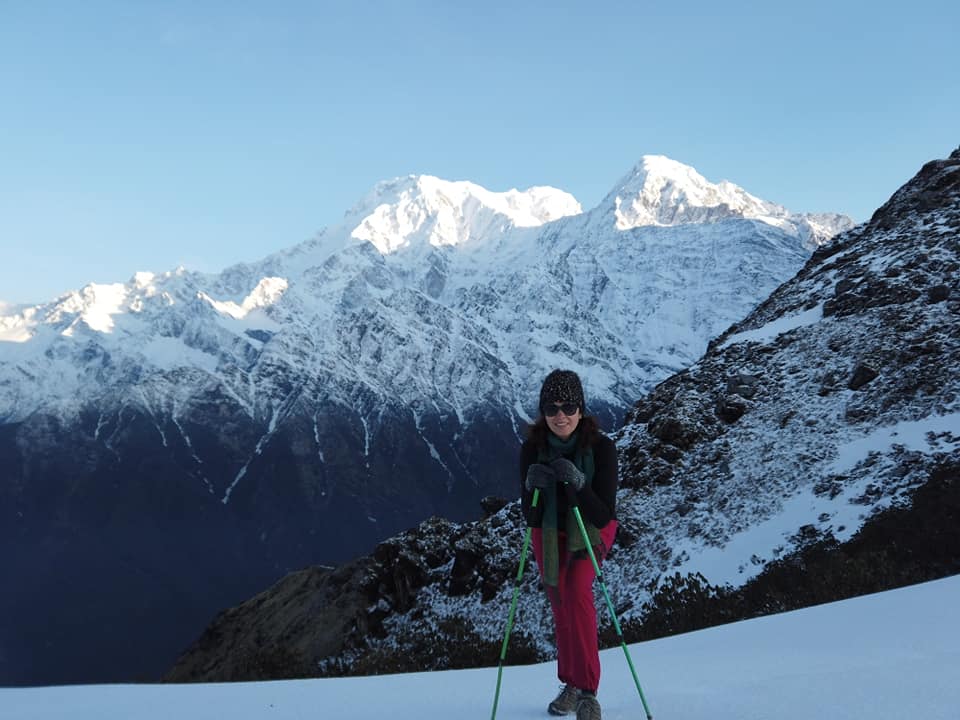
She first sold everything she could: her car, jewellery, clothes, shoes. She used her savings and arranged everything in 2 backpacks, a medical kit and a small bag for papers, money and her phone. That is all she needed, besides the courage and enthusiasm she already had.
“When I get back, I’ll start everything from scratch.”
Natalia doesn’t plan her itinerary. She has no list of cities and places to visit. “I buy my airplane ticket in the very last moment. Just a ticket, no hostel, no idea about visits. Everything is improvised by taking into consideration my wish list, the geographical position of countries and the price of airline tickets. I make use of internet and the help from travellers I meet.”
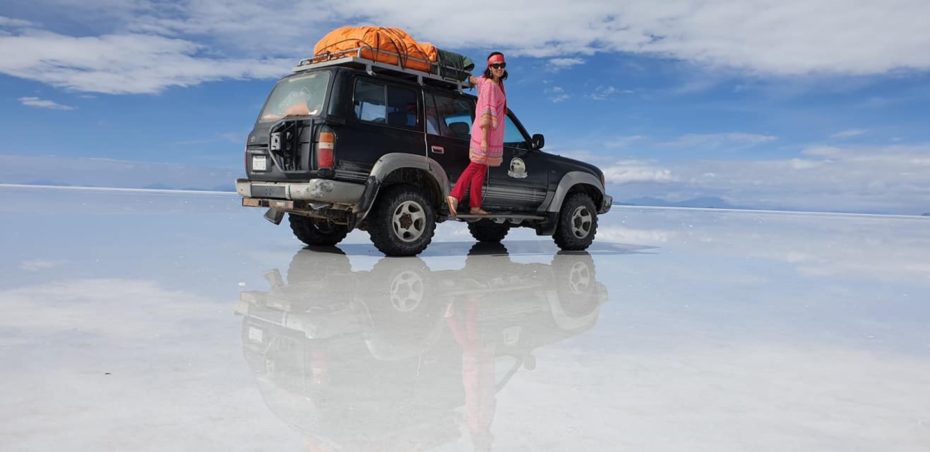
About her once in a lifetime trip
At the moment, Natalia explores India and, since she began her journey in January 2019, she already had the chance to travel to the most beautiful places in Argentina, Chili, Bolivia, Peru, Columbia, Ecuador, Japan, South Korea, China and Nepal. She visited the capital cities and globally recognized touristic attractions, but also got to less popular places, made a lot of friends among the local people and benefited from their hospitality and their priceless recommendations.

Natalia would love to go back to some places one day. “The Carnival of Barranquilla was a great experience. Japan impressed me with its hospitality and sakura. In South Korea I was invited to have dinner with people I met for the first time. I would love to see again the Iguazu Falls in Argentina, the Uyuni salt flat, Peru’s Machu Picchu Mountain, Cotopaxi Volcano in Ecuador… Now, in India, I can hardly wait for the Dalai Lama event.”
About the flip side of the coin
Nonetheless, not everything went smoothly. “I lost 2 airplane tickets. In one case, I did not have the right to make a stop in China, although I had a transit visa. In the second case, I did not have an exit ticket from that country.” Natalia says that India provoked a great cultural shock for her. “It’s hard to understand what’s going on in my soul.” She also had difficulties in communicating with Chinese people, as the majority of them hardly speak English.

Then, she got deeper and observed other important problems existent in the countries she visited. “There are environmental problems everywhere, especially in undeveloped countries where people are not educated to protect nature and the governments do not have the necessary means to manage the garbage. India shocked me completely, as there is misery everywhere, same in Bolivia and Peru. The plastic is a real problem. I became aware the dangerous consequences of our actions because I can observe the difference, since I have been travelling for 15 years,” states Natalia. Our protagonist often collects garbage during her trips, as she wants to make at least a small contribution.

Extremist religions represent one of the current problems of our planet, according to Natalia. “I felt this the most in India, where the Kashmir region is dangerous. The bombings in Sri Lanka have postponed my trip to this country, which I really wanted to visit.”
“The poverty I saw in Bolivia, Peru, Nepal and India hit me like a ton of bricks. I couldn’t ignore the sexual aggression problem in Nepal and India and the always tensioned atmosphere in Colombia, Ecuador and Argentina.”
About her main takeaways
Natalia changed a lot since she first started to travel and surely the metamorphosis is still in process, as she is today in one of the most contrasting countries of this world. She has got some thoughts on developing eco and rural tourism in the Republic of Moldova. “I would need a team and sponsors for implementing them.”
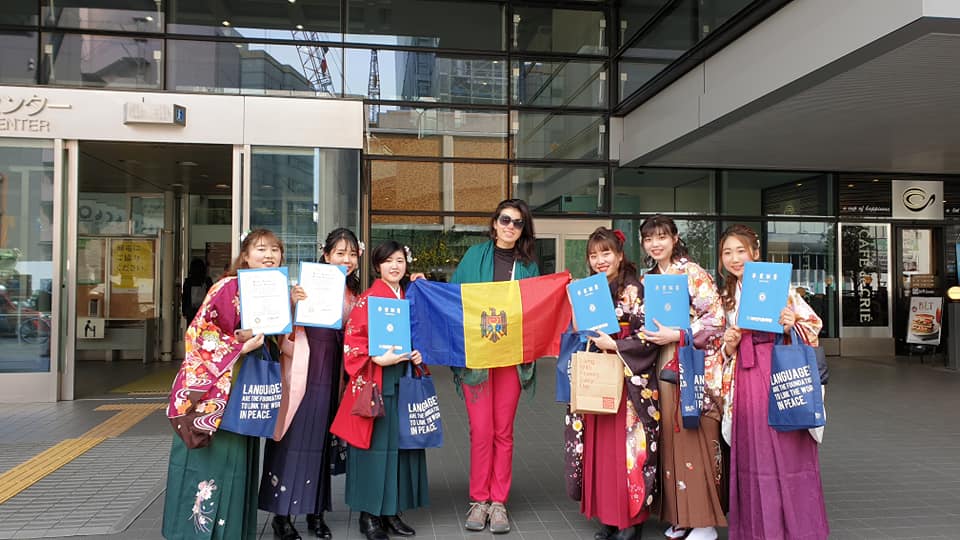
What is really important, is that she found out so many things about herself and the surrounding world. Natalia has a message for other experimenters who would like to do it as well:
“As long as we are in good health and have the will, new horizons need to be explored. We must learn to detach ourselves from a materialist life and appreciate lasting things, as well as people that will be there for us no matter what. To make a trip around the world means to accept challenges, to open oneself, to experience, to learn, to get acquainted with different people, to tolerate other civilizations, to appreciate changes, and to simply love life. So, I invite you to have beautiful and emotional journeys.”
Photos: personal archive
Society
“They are not needy, but they need help”. How Moldovan volunteers try to create a safe environment for the Ukrainian refugees

At the Government’s ground floor, the phones ring constantly, the laptop screens never reach standby. In one corner of the room there is a logistics planning meeting, someone has a call on Zoom with partners and donors, someone else finally managed to take a cookie and make some coffee. Everyone is exhausted and have sleepy red eyes, but the volunteers still have a lot of energy and dedication to help in creating a safe place for the Ukrainian refugees.
“It’s like a continuous bustle just so you won’t read the news. You get home sometimes and you don’t have time for news, and that somehow helps. It’s a kind of solidarity and mutual support,” says Vlada Ciobanu, volunteer responsible for communication and fundraising.
The volunteers group was formed from the very first day of war. A Facebook page was created, where all types of messages immediately started to flow: “I offer accommodation”, “I want to help”, “I want to get involved”, “Where can I bring the products?”, “I have a car and I can go to the customs”. Soon, the authorities also started asking for volunteers’ support. Now they all work together, coordinate activities and try to find solutions to the most difficult problems.
Is accommodation needed for 10, 200 or 800 people? Do you need transportation to the customs? Does anyone want to deliver 3 tons of apples and does not know where? Do you need medicine or mobile toilets? All these questions require prompt answers and actions. Blankets, sheets, diapers, hygiene products, food, clothes – people bring everything, and someone needs to quickly find ways of delivering them to those who need them.
Sometimes this collaboration is difficult, involves a lot of bureaucracy, and it can be difficult to get answers on time. “Republic of Moldova has never faced such a large influx of refugees and, probably because nobody thought this could happen, a mechanism of this kind of crisis has not been developed. Due to the absence of such a mechanism that the state should have created, we, the volunteers, intervened and tried to help in a practical way for the spontaneous and on the sport solutions of the problems,” mentions Ecaterina Luțișina, volunteer responsible for the refugees’ accommodation.
Ana Maria Popa, one of the founders of the group “Help Ukrainians in Moldova/SOS Українці Молдовa” says that the toughest thing is to find time and have a clear mind in managing different procedures, although things still happen somehow naturally. Everyone is ready to intervene and help, to take on more responsibilities and to act immediately when needed. The biggest challenges arise when it is necessary to accommodate large families, people with special needs, for which alternative solutions must be identified.
Goods and donations
The volunteers try to cope with the high flow of requests for both accommodation and products of all kinds. “It came to me as a shock and a panic when I found out that both mothers who are now in Ukraine, as well as those who found refuge in our country are losing their milk because of stress. We are trying to fill an enormous need for milk powder, for which the demand is high and the stocks are decreasing”, says Steliana, the volunteer responsible for the distribution of goods from the donation centers.
Several centers have been set up to collect donations in all regions of Chisinau, and volunteers are redirecting the goods to where the refugees are. A system for processing and monitoring donations has already been established, while the volunteer drivers take over the order only according to a unique code.
Volunteers from the collection centers also do the inventory – the donated goods and the distributed goods. The rest is transported to Vatra deposit, from where it is distributed to the placement centers where more than 50 refugees are housed.
When they want to donate goods, but they don’t know what would be needed, people are urged to put themselves in the position of refugees and ask themselves what would they need most if they wake up overnight and have to hurriedly pack their bags and run away. Steliana wants to emphasise that “these people are not needy, but these people need help. They did not choose to end up in this situation.”
Furthermore, the volunteer Cristina Sîrbu seeks to identify producers and negotiate prices for products needed by refugees, thus mediating the procurement process for NGOs with which she collaborates, such as Caritas, World Children’s Fund, Polish Solidarity Fund, Lifting hands, Peace Corps and others.
One of the challenges she is facing now is the identifying a mattress manufacturer in the West, because the Moldovan mattress manufacturer that has been helping so far no longer has polyurethane, a raw material usually imported from Russia and Ukraine.
Cristina also needs to find solutions for the needs of the volunteer groups – phones, laptops, gsm connection and internet for a good carrying out of activities.
Hate messages
The most difficult thing for the communication team is to manage the hate messages on the social networks, which started to appear more often. “Even if there is some sort of dissatisfaction from the Ukrainian refugees and those who offer help, we live now in a very diverse society, there are different kind of people, and we act very differently under stress,” said Vlada Ciobanu.
Translation by Cătălina Bîrsanu
Important
#WorldForUkraine – a map that shows the magnitude of the world’s actions against Russian aggression

The international community and volunteers from all over te world have launched #WorldForUkraine as a platform that shows the magnitude of the world’s actions against the Russian aggression. In a digital world – it is an interactive map of public support of Ukrainians under the hashtag #WorldForUkraine – rallies, flash mobs, protests around the world. In the physical dimension – it is your opportunity to take to the streets and declare: “No to Putin’s aggression, no to war.”
„Today, along with the political and military support, emotional connection with the civilized world and truthful information are extremely important for Ukraine. The power to do it is in your hands. Join the #WorldForUkraine project and contribute to the victorious battle against the bloodshed inflicted on Ukraine by the aggression of the Russian Federation”, says the „about the project” section of the platform.
Go to the streets — Tell people — Connect and Unite — Become POWERFUL
Volunteers have launched #WorldForUkraine as a platform that shows the magnitude of the world’s actions against Russian aggression. In digital world – it is an INTERACTIVE MAP of public support of Ukrainians worldforukraine.net under the hashtag #WorldForUkraine – rallies, flash mobs, protests around the world. In the physical dimension – it is your opportunity to take to the streets and declare: “No to Putin’s aggression, no to war.” There you may find information about past and future rallies in your city in support of Ukraine. This is a permanent platform for Ukrainian diaspora and people all over the world concerned about the situation in Ukraine.
So here’s a couple of things you could do yourself to help:
* if there is a political rally in your city, then participate in it and write about it on social media with geolocation and the hashtag #WorldForUkraine
* if there are no rallies nearby, organize one in support of Ukraine yourself, write about it on social media with geolocation adding the hashtag #WorldForUkraine
The map will add information about gathering by #WorldForUkraine AUTOMATICALLY
Your voice now stronger THAN ever
All rallies are already here: https://worldforukraine.net
Important
How is Moldova managing the big influx of Ukrainian refugees? The authorities’ plan, explained

From 24th to 28th of February, 71 359 Ukrainian citizens entered the territory of Republic of Moldova. 33 173 of them left the country. As of this moment, there are 38 186 Ukrainian citizens in Moldova, who have arrived over the past 100 hours.
The Moldovan people and authorities have organized themselves quickly from the first day of war between Russia and Ukraine. However, in the event of a prolonged armed conflict and a continuous influx of Ukrainian refugees, the efforts and donations need to be efficiently managed. Thus, we inquired about Moldova’s long-term plan and the state’s capacity to receive, host, and treat a bigger number of refugees.
On February 26th, the Ministry of Labor and Social Protection of Moldova approved the Regulation of organization and functioning of the temporary Placement Center for refugees and the staffing and expenditure rules. According to the Regulation, the Centers will have the capacity of temporary hosting and feeding at least 20 persons, for a maximum of 3 months, with the possibility of extending this period. The Centers will also offer legal, social, psychological, and primary medical consultations to the refugees. The Center’s activity will be financed from budget allocations, under Article 19 of Provision no. 1 of the Exceptional Situations Commission from February 24th, 2022, and from other sources of funding that do not contravene applicable law.
The Ministry of Inner Affairs and the Government of Moldova facilitated the organization of the volunteers’ group “Moldova for Peace”. Its purpose is to receive, offer assistance and accommodation to the Ukrainian refugees. The group is still working on creating a structure, registering and contacting volunteers, etc. It does not activate under a legal umbrella.
Lilia Nenescu, one of the “Moldova for Peace” volunteers, said that the group consists of over 20 people. Other 1700 registered to volunteer by filling in this form, which is still available. The group consists of several departments:
The volunteers’ department. Its members act as fixers: they’re responsible for connecting the people in need of assistance with the appropriate department. Some of the volunteers are located in the customs points. “The Ministry of Inner Affairs sends us every day the list of the customs points where our assistance is needed, and we mobilize the volunteers”, says Lilia Nenescu.
The Goods Department manages all the goods donated by the Moldavian citizens. The donations are separated into categories: non-perishable foods and non-food supplies. The volunteers of this department sort the goods into packages to be distributed.
The Government intends to collect all the donations in four locations. The National Agency for Food Safety and the National Agency for Public Health will ensure mechanisms to confirm that all the deposited goods comply with safety and quality regulations.
The Service Department operates in 4 directions and needs the volunteer involvement of specialists in psychology, legal assistance (the majority of the refugees only have Ukrainian ID and birth certificates of their children); medical assistance; translation (a part of the refugees are not Ukrainian citizens).
According to Elena Mudrîi, the spokesperson of the Ministry of Health, so far there is no data about the number of Covid-19 positive refugees. She only mentioned two cases that needed outpatient medical assistance: a pregnant woman and the mother of a 4-day-old child.
The Accommodation Department. The volunteers are waiting for the centralized and updated information from the Ministry of Labor about the institutions offering accommodation, besides the houses offered by individuals.
The Transport Department consists of drivers organized in groups. They receive notifications about the number of people who need transportation from the customs points to the asylum centers for refugees.
The municipal authorities of Chișinău announced that the Ukrainian children refugees from the capital city will be enrolled in educational institutions. The authorities also intend to create Day-Care Centers for children, where they will be engaged in educational activities and will receive psychological assistance. Besides, the refugees from the municipal temporary accommodation centers receive individual and group counseling.
In addition to this effort, a group of volunteers consisting of Ana Gurău, Ana Popapa, and Andrei Lutenco developed, with the help of Cristian Coșneanu, the UArefugees platform, synchronized with the responses from this form. On the first day, 943 people offered their help using the form, and 110 people asked for help. According to Anna Gurău, the volunteers communicate with the Government in order to update the platform with the missing data.
Translation from Romanian by Natalia Graur












